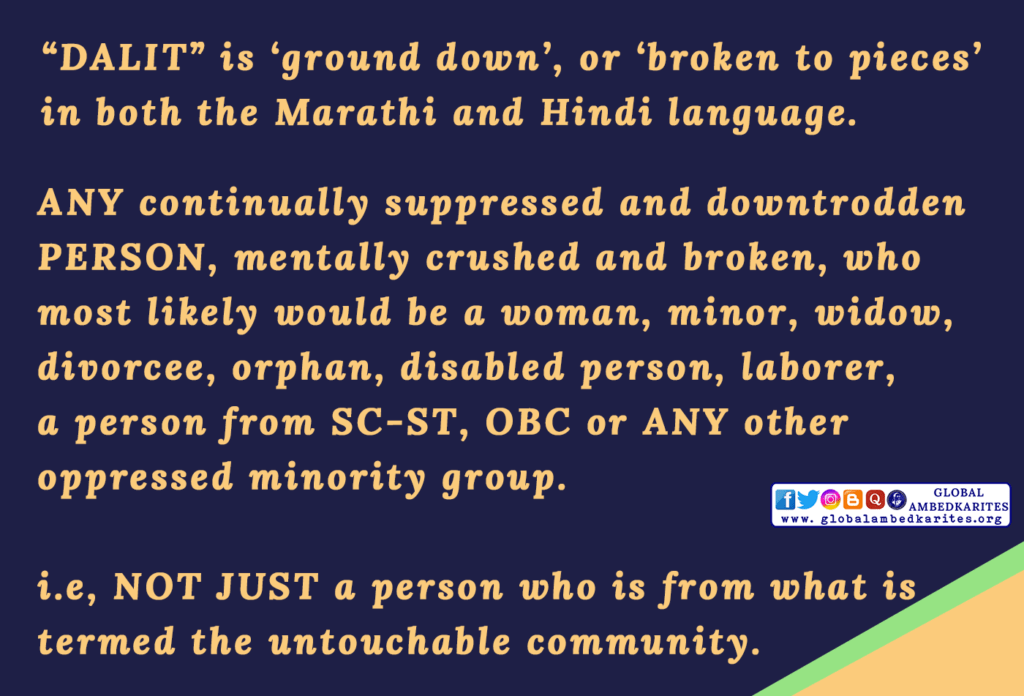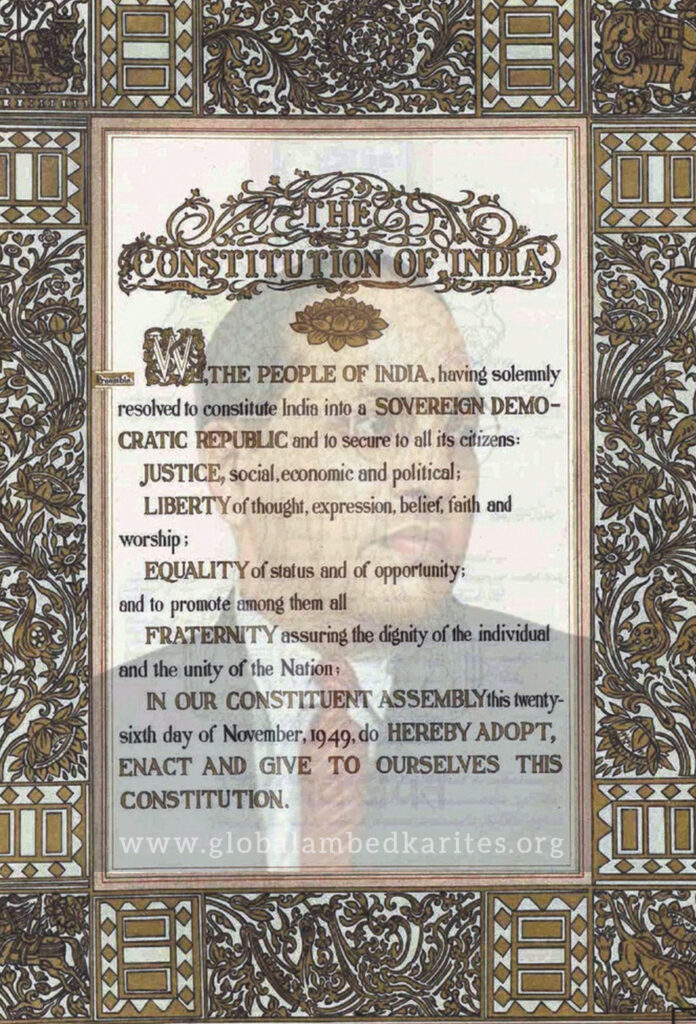
The exact meaning of the word “DALIT” is ‘ground down’, or ‘broken to pieces’ in both the Marathi and Hindi language
Academic Ref: Anupama Rao, Representing Dalit selfhood
The word ‘DALIT” is used as an adjective and a noun, derived from the verb, ‘dalan’ meaning ‘oppression’ (but today, it is often incorrectly used as a noun to label the historically Avarna Untouchable communities only) and in proper context, used to describe:
ANY continually suppressed and downtrodden PERSON, mentally crushed and broken, who most likely would be a woman, minor, widow, divorcee, orphan, disabled person, laborer, a person from SC-ST, OBC or ANY other oppressedminority group.
i.e, NOT JUSTa person who is from what is termed the untouchable community.
Dalit, a broken continually suppressed victim of atrocities, could be a Brahmin who has been (and still is) grounded and unfairly treated in an inhumane way.
(NOT that it will change the above meaning of the words ‘dalit’ and ‘dalan’, it is said that these words are derived from ‘dal’. ‘Dal’ means ‘a group’).
DALIT (AS A NOUN):
As far as annihilation of caste is concerned, when the word “Dalit” is used as a noun, it is damaging to the crucial Scheduled Castes “SC” identity.
The term “Scheduled Castes” MUST be understood and read as: “Scheduled Occupations” or as, “scheduled unrepresented communities”, NOT as jatis.
The Legally Scheduled Castes do not include all ex-untouchables. To say or imply “Dalit is a replacement for Scheduled Castes” is NOT RIGHT but to say “Scheduled Castes and other ex-untouchable Avarnas WERE dalits” is acceptable.
Therefore, if assertion of identity is the aim, ex-untouchables should unite as Scheduled Castes (or aim to be included in that list) and NOT “SCs unite as Dalits“.
DALIT (AS AN ADJECTIVE):
Even as an ADJECTIVE (describing word), for example as in dalit President, dalit intellectual etc, using the word dalit doesn’t compute well for then, these terms would mean crushed /grounded President or mentally broken to pieces intellectuals.
DALIT (Re LEGAL REPRESENTATION)
Using the word “Dalit” for Castes (community occupations) that were scheduled for representation is also damaging in reference to legal representation and annihilation of jatis.
Propagating dalit /dalitness to exclusively represent SCs, the EX-untouchables, is counter-productive to the original idea of compiling this schedule. This could be intentional or unintentional, depending on whether one wants to propagate or annihilate the jati system, inaccurately called the caste system (caste is Varna + Jati). It is counter-productive because the route, Identity-less DALIT UNTOUCHABLE –> SC Identity (that Babasaheb Dr Ambedkar so tirelessly worked towards) is in total opposition to the route, SC–> DALIT UNTOUCHABLE. The later currently being tirelessly worked toward.
Neither should the word “Dalit” be used as a replacement word for the already senseless term “low/er Jatis/castes” because the “Scheduled Castes” are OCCUPATIONS (not jatis) that the identity-less engaged in. People from these occupations were jatiless and religionless. Having no legal identity meant having NO OPPORTUNITY TO LEGALLY REPRESENT THEMSELVES IN ANY WAY.
THE PSEUDO-DALITS
These are people who ARE NOT really dalits (as per the defininition of “dalit”) but those who simply refer to themselves as dalits for the sake of a political identity AND still identity themselves as untouchables, whose ancestors were once actually dalits (the grounded).
Many Pseudo-dalit academics and entrepreneurs are anti ‘caste discrimination’ activists but NOT Anti ‘Caste’ activists.
NOTE: Since in foreign cultures there is no equivalent word or system to represent thejatisystem (except those sprouting from the culture of the Indian subcontinent), it is not wise to use a European/foreign word to use as a substitute for the word jati.
The sociologist G. S. Ghurye wrote in 1932 that, despite much study by many people,
we do not possess a real general definition of caste. It appears to me that any attempt at definition is bound to fail because of the complexity of the phenomenon. On the other hand, much literature on the subject is marred by lack of precision about the use of the term.
Therefore, it would be more accurate and make more sense to simply use the word ‘jati’ instead of caste.
JATI, in the PaliLanguage means BIRTH; defined in Hindi-English science dictionaries as SPECIES. The word JATI is an actual biological term, used in biology lessons when teaching classification of living things in Hindi medium schools.
Using the word ‘Dalit’ to EXCLUSIVELY label the SCs and/or other Avarna ex-Untouchables is counter productive to annihilation of jati (AoJ), the dream of the father of modern India, Babasaheb Dr B.R Ambedkar and other Indian greats.
Dalitness is more and more being accepted as something which means, related to “LOW/EST JATI/S” whereas we know that SCs had no jatis.
Thus, the word ‘dalit’, as it is normally used, is a hinderance to Annihilation of jatis. A “Dalit” is commonly perceived as someone belonging to a “low” jati (or an untouchable).
THIS IMPLIES THAT:
The person who calls her/himself a ‘dalit’ (actually a Pseudo Dalit), hasn’t given up or isn’t ready to give up his/her jati identity and therefore, annihilation of the CONCEPT of jati becomes IMPOSSIBLE.
To annihilate the concept of jati, the victims foremost MUST understand that:
- Strictly speaking, no-one really has or ever had a jati as it is perceived. The literal meaning of jati is SPECIES. Their ancestors were MADE TO BELIEVE that they belonged to a particular jati/species
- The Avarna Untouchables were NOT CONSIDERED to belong to the human jati/species at all and therefore fell outside theVarna system too. They weren’t even worth keeping as slaves, for then, there would be that risk of touching the forbidden species.
- There is NO useful purpose in modern society to classify any homosapien as belonging to any particular jati/species UNLESS one professes to belong to the dominant oppressing ‘jatis’/species which are commonly but unethically referred to as the higherjatis/castes.
I find it difficult to understand how and why Indian academicians have managed to overlook these fundamentals of annihilation of jati. It is etched in the preamble of the Indian constitution that Indian citizens should aspire to work towards Liberty, Equality, Fraternity and justice for all. This is IMPOSSIBLE to achieve in a society which classifies it’s citizens into jatis (different species) and Varnas, collectively known as castes.

So the priority for a true Indian becomes: annihilation of the CONCEPT of jati but a “dalit” will never be able to do that because this idea is unlikely to enter her/his mind as s/he is most likely, subconsciously attached to the jati that was forced on them.
One must also realise that in reality no person is an untouchable. If you really want to, you are able to touch any person with consent. People are untouchables only in the sick minds of those who consider themselves as the touchables.
Question for the Pseudo-Dalits:
Can there be ‘dalits’ as is commonly understood, if there are no jaatis?
CAMPAIGN against the use of the word ‘dalit’ EXCLUSIVELY for the scheduled castes (or exclusively for all “ex-untouchables” including Muslims and Christians):
For the English speakers, to realise the abusive, derogatory and casteist nature of the use of the word ‘dalit’ when exclusively reserved to label a certain section of society, replace it with any of its English equivalents; broken to small pieces, crushed, grounded, depressed, suppressed, oppressed, downtrodden victims of atrocities.
Being referred to as a dalit is a constant reminder of ones past ensuring the stigma isn’t removed.
IF: A PERSON HAS BEEN, IN THE PAST CONTINUALLY OPPRESSED /ROBBED /RAPED /VICTIMIZED /CRUSHED /CURSED GROUNDED /BROKEN.
THEN: MODERN SOCIETY WOULD NEVER PERMANENTLY LABEL THEM AS.. THE OPPRESSED, THE ROBBED, THE RAPED, THE VICTIMISED, THE CRUSHED / THE CURSED /THE GROUNDED / THE BROKEN ETC.
SO, WHY ATTEMPT TO GLUE THE “DALIT” LABEL PERMANENTLY ON THOSE WHO WERE (OR WHOSE ANCESTORS WERE) ONCE GROUNDED MENTALLY BROKEN AND CRUSHED VICTIMS OF ATROCITIES.
Call them dalits if they really are still dalits, the grounded mentally broken to pieces victims.
Should the word “dalit” be used or not?
It really depends on who you are referring to when using that word. It can clearly be used in some cases, otherwise that word wouldn’t exist.
Regardless of what it means, it is wrong to use ANY LABEL to refer to people from the so-called lower castes, other than what is constitutionally allowed and recommended by the pioneers of annihilation of jatis and untouchability, including Dr Ambedkar. He too was, rightly against re-labeling the then so-called untouchables as Harijans.
This is just ONE of the many reasons why Dr Ambedkar objected to Mr Gandhi’s use of the word “Harijan”
By using ANY other word, whether Harijan or Dalit, to permanently tag these people, you are simply re-labelling them as permanently belonging to the so called ”low castes” or untouchables. This is a hinderance to annihilation of caste and Mr Gandhi knew that.. -Period.
Yes, the word “Dalit” is unwisely, albeit unknowingly, casually used even by many ‘hardcore’ human rights activists when refering to people who they consider belong to any ex-untouchable community, scheduled or not.
Most academicians, for various reasons (assigning of a political identity being one of them), prefer to use A word and very conveniently (for them) use ‘dalit’, not realizing that by doing so they are falling in the casteist’s trap that hinders AOJ (Annihilation of Jati). This must stop. Otherwise they end up doing the dirty work on behalf of casteist manuvadis who very cleverly promote Manuism, serving the Brahminvad Agenda.
Until, the historically deprived groups STOP REFERRING TO THEMSELVES as dalits, the manu-stream media will carry on with this Neuro Linguistic brainwashing that vehemently promotes dalitism/harjanism/untouchablization.
So, a Dalit should not be considered as a label for any person from any particular group /jati /caste. It can, on occasions, be used to describe those who actually are depressed, mentally broken, oppressed, grounded, crushed etc.
Statements such as, “Mr so and so fought for the rights of dalits” could be used AS LONG AS the listener/reader understands that the word ‘DALIT” is used to describe:
ANY continually suppressed and downtrodden PERSON, mentally crushed and broken, who most likely would be a woman, minor, widow, divorcee, orphan, disabled person, labourer, a person from SC, ST , OBC or any other oppressed minority group.
i.e, NOT JUST FROM so called low castes and untouchables.
ANY continually suppressed and downtrodden PERSON, mentally crushed and broken, who most likely would be a woman, minor, widow, divorcee, orphan, disabled person, labourer, a person from SC, ST , OBC or any other oppressed minority group.
i.e, NOT JUST FROM so called low castes and untouchables.
A dalit, a continually suppressed victim of atrocities, could be a Brahmin who is unfairly treated in an inhumane way.
ONLY if a dalit is understood as such, can we really say that a person fought for the rights of dalits (ALL dalits). Not just for the rights of SCs.
Terms like Dalit-writer should also be avoided.
Does a “dalit writer” mean: A person who writes about dalits, the oppressed?
OR: A writer who himself is a dalit? i.e a mentally crushed and broken depressed and suppressed victim of continual oppression.
A slave in shackles cannot save other slaves from slavery. Only a person who is free can do that. It is noble to fight on behalf of those who are still dalits. But untruthfully and unnecessarily calling yourself a dalit is a hindrance to annihilation of the concept of Jati/caste.
ANNIHILATE THE CONCEPT OF JATI/ CASTE. A self-made dalit will NEVER be able to do that for..
SLAVES WHO LOVE THE SMELL OF THEIR CHAINS CAN NEVER THEMSELVES BE FREE.
Today a so-called untouchable can quite easily become a touchable by simply coming out of the Hindu-fold and is therefore better placed than a pseudo-dalit who calls her/himself a dalit since, a self declared dalit is more likely to remain a dalit all her/his life.




